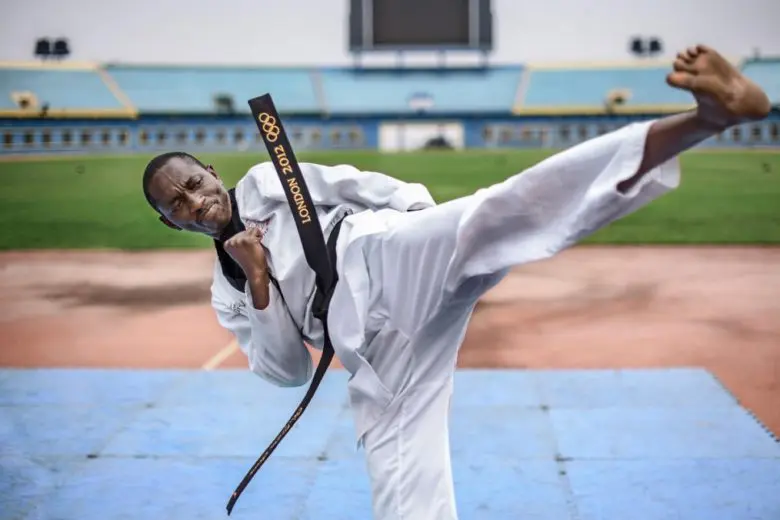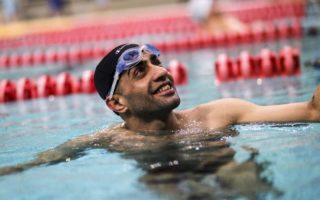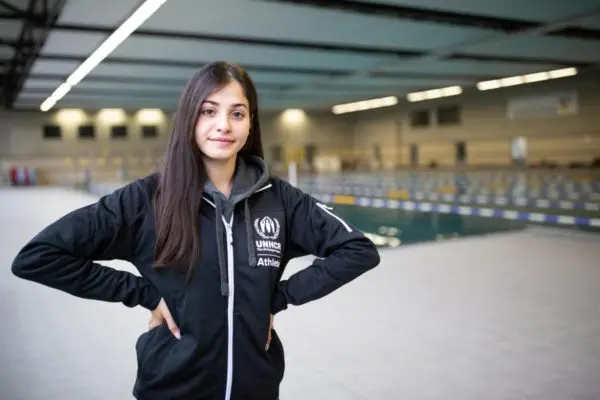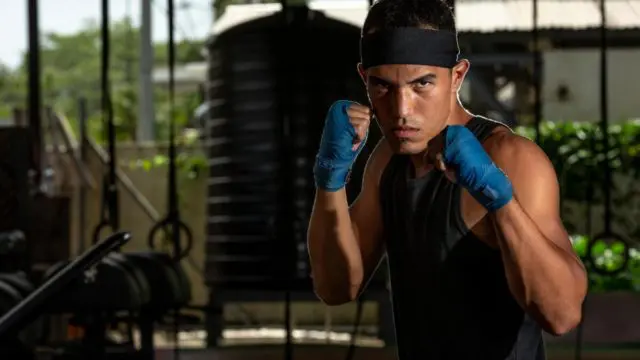
Burundian refugee Parfait Hakizimana during a Taekwondo training session at the Amahoro Stadium in Rwanda’s capital, Kigali. © UNHCR/Anthony Karumba
Competitors in four sports – including first female refugee Paralympian – ready to take to world stage after beating the odds despite being forced to flee their homes.
Six athletes from the fields of swimming, athletics, canoeing and Taekwondo have been selected to compete on the world’s biggest sporting stage as members of the Refugee Paralympic Team at the Tokyo 2020 Paralympic Games.
The team announced by the International Paralympic Committee (IPC) on Wednesday comprises one woman and five men, who have all excelled in their chosen sports. Some were injured in war, and others experienced life-changing injuries or medical conditions while living in exile.
Among them is the first female refugee Para athlete and the youngest member of the team, Alia Issa, 20, a Syrian refugee living in Greece who will compete in the club throw – a specialist event for athletes unable to grip a javelin, shot put or discus.
Alia contracted smallpox aged four, which resulted in brain damage that left her with physical and intellectual impairments. After losing her father to cancer, she discovered sports three years ago at her school in Greece, and now competes internationally, most recently placing fourth at the 2021 World Para Athletics European Championships.
Alia said that getting involved in sport was a pivotal important moment for her, making her feel stronger and more confident. “I would like to tell people that if they have a child with impairments like me, don’t keep them hidden at home. Encourage them to participate in sport,” she said.
One of two swimmers on the team, Abbas Karimi is an Afghan refugee now living in Fort Lauderdale in the United States, who earlier this year became a High Profile Supporter for UNHCR, the UN Refugee Agency. Born without both arms, he faced discrimination in his homeland due to his disability and his ethnicity and fled to Turkey, where he lived for four years as a refugee before being resettled to the US.
Abbas has won eight medals, including a silver in the Mexico City 2017 World Para Swimming Championships, and is hopeful of claiming another in Tokyo. “I believe I have the potential to make the podium at the Paralympics and I believe it is important for all refugees and our legacy that one of us refugee athletes make the podium, it can bring change for refugees and inspire and bring hope,” he said.
Another bidding for glory in the pool is Ibrahim al Hussein, originally from Syria, who competed at the Rio Paralympic Games in 2016 as a member of the first two-person Independent Paralympic Team featuring refugees and asylum seekers. Ibrahim, who now lives in Greece, had his right leg amputated below the knee after being caught in a bomb blast whilst trying to help an injured friend in Syria.
A keen swimmer since childhood, he described competing at the Paralympics as a dream come true. “I want every refugee to have opportunities in sport. I cannot imagine my life without sport,” Ibrahim said.
“I cannot imagine my life without sport.”
Fellow Syrian Anas Al Khalifa fled to Germany via Turkey in 2015, where he worked installing solar panels before a spinal cord injury sustained in a fall from a two-storey building in 2018 left him with limited movement and sensation in his lower limbs.
His physiotherapist introduced him to para canoeing a little over a year ago, and thanks to his dedication to training and the support of his coach – herself a former Olympic medalist – Anas has made remarkable progress. “When I go to train, sport is kind of demonstrating how you can accomplish so many things and you forget about the disability. It makes you feel like you don’t have any impairment anymore,” Anas said.
Shahrad Nasajpour, who was the second member of the Independent Paralympic Team in Rio, will again compete in the discus throw in Tokyo. Born in Iran with cerebral palsy, he first took up table tennis before switching to Para Athletics. After moving to the US in 2015, he contacted the IPC about the idea of a refugee team for Rio, eventually booking his place at the Games.
As one of the pioneers of the Refugee Paralympic Team, Shahrad is encouraged by its expansion to six members for Tokyo. “When you have a group, you get more attention. It’s so great to see more athletes involved now. I hope this gets bigger and bigger in the coming years,” he said.
“It’s so great to see more athletes involved now.”
The final team member is Parfait Hakizimana, who will travel to Tokyo from Rwanda’s Mahama Refugee Camp where he has lived since fleeing conflict in Burundi. After losing his arm aged 8 during an attack in which his mother was killed, he later took up Taekwondo and now competes internationally while also training refugee children living in the camp.
Parfait credits the values of respect, friendship, and competitiveness promoted by Taekwondo with helping him to find his own place in a new country. “Refugees don’t have a lot. But sport helps them forget their troubles,” he explained.
The Refugee Paralympic Team was announced via video by stars from the world of music, sport, literature, stage and screen, including UNHCR Goodwill Ambassadors. The athletes will compete under the IPC flag in Tokyo, and will be the first team to enter the Japan National Stadium during the opening ceremony on 24 August.
Subscribe to UNHCR’s mailing list
The team will represent more than 82 million people worldwide forced to flee conflict, persecution and human rights abuses, 12 million of whom live with a disability and often face increased risks and barriers to accessing assistance and opportunities, including participation in sports.
UNHCR is working with the IPC to support the team’s participation in Tokyo and, together with the athletes, advocate for a world in which all forcibly displaced people – with or without disabilities – have equal access to sport and other forms of inclusion.
Originally published by UNHCR on 30 June 2021.





